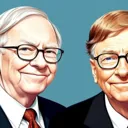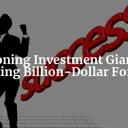Tags: Comments
This fanpage is not officially affiliated with Berkshire Hathaway: Disclaimer
Berkshire Hathaway stands as a colossal conglomerate with a storied history, renowned for its strategic investments under the astute leadership of Warren Buffett. As we review 2024, Berkshire Hathaway finds itself at a pivotal juncture, marked by notable changes and challenges that could redefine its path forward. This year, the company has amassed a record-breaking cash reserve, prompting strategic shifts in its investment portfolio that demand a closer examination.
The significance of these developments cannot be overstated, as they reflect broader economic and market trends that are shaping the global financial landscape. Our aim is to a comprehensive, engaging, and multidimensional review of these changes, offering insights into how Berkshire Hathaway is navigating this complex environment. Key themes such as cash management, investment strategy, market performance, and economic factors will be explored in depth, offering a window into the company's strategic odyssey.
Historically, Berkshire's strategies have been a mirror to the economic cycles, drawing parallels to previous periods of financial uncertainty. As we delve into the intricacies of 2024, we will examine how Berkshire's current maneuvers align with its past approaches, providing a rich context for understanding its future trajectory.
As we anticipate the annual report, let's take a moment to highlight six standout aspects of Berkshire Hathaway's 2024.

1. Record Cash Pile
Berkshire Hathaway's cash reserves have reached an unprecedented $325.2 billion by the end of Q3 2024, marking a significant milestone in the company's financial strategy 1. This towering cash pile, when compared to pre-2007/8 levels, suggests a potential preparation for market turmoil, echoing Buffett's historically cautious approach during periods of economic uncertainty.
A substantial portion of this reserve, over 88% or $288 billion, is invested in U.S. Treasurys, underscoring a conservative stance amidst a volatile market environment 1. This strategy not only reflects a cautious approach but also serves as a buffer against economic downturns, providing Berkshire with the flexibility to seize opportunities as they arise.
The significance of this cash reserve is further illuminated when viewed through the lens of the "Buffett Indicator," which has reached around 200%, indicating a potential overvaluation in the stock market 2. Historically, Buffett has navigated similar scenarios with prudence, as evidenced by the profitable investment in Bank of America during the 2011 crisis. This move, which involved a $5 billion investment yielding significant returns, exemplifies Buffett's ability to leverage cash reserves during times of economic uncertainty 8.
With this formidable cash position, Berkshire is well-poised for potential acquisitions or strategic investments, ready to capitalize on market dislocations. As we explore Berkshire's strategic odyssey in 2024, this record cash pile stands as a testament to the company's enduring commitment to financial resilience and opportunistic growth.
2. Portfolio Changes: Apple, Bank of America et al.
In 2024, Berkshire Hathaway embarked on a strategic recalibration of its investment portfolio, marked by significant changes that reflect both caution and opportunity in the current economic landscape. One of the most notable moves was the substantial reduction of Berkshire's stake in Apple ↗. Warren Buffett, known for his long-term investment horizon, trimmed the company's holdings by two-thirds, reducing the stake's value from nearly $175 billion to approximately $70 billion 1. This decision underscores a cautious approach amid potentially overvalued market conditions, despite Apple's robust performance and significant contribution to Berkshire's earnings.
The strategic trimming extended to Bank of America, where Berkshire sold over 235 million shares, reducing its stake to less than 10% of the bank's outstanding shares 1. This move suggests a reevaluation of Berkshire's exposure to the financial sector, possibly influenced by broader economic uncertainties and regulatory changes affecting banks.
In a bid to diversify, Berkshire made new investments in Ulta Beauty, Domino's Pizza, Heico Corp., and Pool Corp. 1. These acquisitions highlight a shift towards consumer goods and services, aerospace, and leisure industries, signaling a strategic pivot to sectors with potential growth and resilience. However, the near-complete sale of Ulta Beauty shares within the same year marked an unusual departure from Berkshire's typical long-term strategy, suggesting a reassessment of its initial investment thesis 1.
Historically, Berkshire Hathaway's portfolio shifts have aligned with market trends and Buffett's value-oriented philosophy. The decision to exit positions in HP, Paramount Global, Floor & Decor, and Snowflake reflects a strategic realignment, likely driven by performance metrics and future growth prospects 1. These moves are indicative of Buffett's adaptive strategy, balancing between seizing opportunities and mitigating risks in an evolving market landscape.
The broader economic and market factors influencing these investment decisions include heightened market volatility, inflationary pressures, and geopolitical tensions. As Berkshire navigates these challenges, its portfolio changes reflect a blend of caution and strategic foresight, aiming to optimize returns while safeguarding against potential downturns.
3. Share Buybacks Paused
In the first nine months of 2024, Berkshire Hathaway repurchased $2.9 billion worth of shares, continuing its practice of returning value to shareholders 3. However, the absence of buybacks in Q3 marked a significant departure from a six-year trend 2. This decision not to repurchase shares during this quarter, despite a substantial cash reserve of over $320 billion, suggests a cautious stance towards the market's current valuation levels.
Historically, Berkshire adhered to a policy of not buying back shares when trading over 1.2 times its book value, a guideline that was scrapped in 2018 2. The decision to halt buybacks in Q3, as the stock traded at around 1.6 times its book value, may indicate concerns about market overvaluation. Analyst Cathy Seifert remarked that this move could lead investors to question the stock's attractiveness, while Professor Aswath Damodaran noted it as a sign of management's cautious outlook on a "richly priced" market 2.
The lack of buybacks aligns with Buffett's long-term capital allocation strategy, prioritizing investments that promise consistent earning power and strong returns on equity. Historically, Berkshire's buyback patterns have been influenced by market conditions, with buybacks often serving as a tool to enhance shareholder value during periods of undervaluation ↗.
| Year | Buybacks ($ Billion) | Market Conditions |
|---|---|---|
| 2018 | 1.3 | Market volatility, undervaluation |
| 2019 | 5.0 | Continued volatility, strategic buybacks |
| 2020 | 24.7 | Pandemic-induced market fluctuations |
| 2021 | 27.0 | Recovery phase, strategic opportunities |
| 2022 | 7.9 | Stabilizing market, selective buybacks |
| 2023 | 8.0 | Market recovery, cautious optimism |
| 2024 | 2.9 (first 9 months) | High valuations, cautious approach |
The table above illustrates Berkshire's historical buyback trends, highlighting how market conditions have influenced its capital allocation decisions. The strategic pause in Q3 2024 underscores Buffett's prudence in navigating an uncertain economic backdrop, ensuring that capital is deployed effectively to maximize long-term shareholder value.
The big question remains: Will Berkshire's share price decline enough to trigger another round of buybacks, or will the book value rise to close the gap?
4. Strong Stock Performance
In 2024, Berkshire Hathaway demonstrated robust stock performance, with its Class B shares appreciating by approximately 27% over the year, closing at around $453 on December 30, 2024 7. This impressive growth outpaced the S&P 500's increase of about 24%, highlighting Berkshire's relative strength in a competitive market 2. Berkshire shares are trading at around 1.6 times their book value, a significant indicator of market confidence and investor interest 2.
Several factors contributed to this strong stock performance. Firstly, Berkshire's strategic investments in companies with consistent earning power and strong returns on equity have consistently provided a solid foundation for growth. With approximately 60% of Warren Buffett's investment portfolio in stalwarts like Apple, American Express, Coca-Cola, and Bank of America, Berkshire's portfolio has been well-positioned to capitalize on market opportunities 3.
Moreover, Berkshire's ability to navigate complex economic environments has historically been a hallmark of its success. During periods of economic uncertainty, such as the late 1990s, Berkshire's prudent investment strategies and focus on long-term value creation have often resulted in superior stock performance. This historical context underscores the company's resilience and adaptability, traits that continue to resonate with shareholders.
The strong performance of Berkshire's stock in 2024 has likely bolstered shareholder sentiment, reinforcing confidence in the company's strategic direction and management's ability to deliver value. As Berkshire continues to leverage its substantial cash reserves for potential acquisitions and investments, the outlook for sustained growth remains promising.
5. Catastrophe Losses
Despite the impressive stock performance, Berkshire Hathaway faced significant challenges in 2024 due to catastrophe losses. The company incurred $465 million in losses from events such as Hurricane Milton, which alone is expected to result in pre-tax losses between $1.3 billion and $1.5 billion 3. Additionally, Hurricane Helene contributed estimated losses of $565 million, further impacting the financial landscape 4.
These events have had a notable effect on Berkshire's insurance underwriting income, which decreased from $2.422 billion in Q3 2023 to $750 million in Q3 2024 4. This decline underscores the financial strain that catastrophe events can impose on even the most robust insurance operations.
Historically, Berkshire has been exposed to catastrophe losses, yet the company has consistently demonstrated resilience and an ability to recover. Its strategic decision to reduce property reinsurance writings in Q2 2024 was a proactive measure to mitigate potential hurricane losses, reflecting a prudent approach to risk management 4. By not participating in the Florida Citizens mid-year renewal in 2024, Berkshire avoided additional exposure, a decision that may have cushioned the financial impact.
The long-term implications of these losses on Berkshire's insurance operations warrant careful consideration. While the immediate financial impact is significant, Berkshire's strategic foresight and robust financial reserves position it well to absorb these shocks and continue delivering value to shareholders. As the company navigates these challenges, its commitment to disciplined risk management and strategic adaptation remains a cornerstone of its enduring success.
6. Interest Rate Cuts
In the ever-evolving landscape of global finance, the Federal Reserve's recent decision to implement a half-point cut in interest rates marks a significant shift, directly impacting Berkshire Hathaway's strategic positioning. Historically, Berkshire Hathaway has thrived in environments with rising short rates, as evidenced by the substantial increase in its interest and other investment income, which soared by 80% in the first half of 2024, reaching $4.5 billion before taxes5. This impressive growth was largely fueled by higher short rates and a robust cash reserve, which stood at a staggering $277 billion in June, the highest among U.S. companies 5.
However, the landscape is shifting. The yield on Treasury bills, which had peaked at 5.3% in July, has since declined to 4.7% and is projected to drop further to 4% by year-end 5. This downward trend poses a challenge for Berkshire, as lower yields may lead to reduced interest income in 2025, depending on the trajectory of short rates and T-Bill holdings 5. Despite this, Warren Buffett has opted not to extend the maturity of Berkshire’s cash investments into longer-term Treasuries, reflecting his preference for maintaining liquidity and minimizing credit or rate risk 5.
While the decline in interest rates presents a potential headwind for Berkshire's investment income, it also opens avenues for other segments of the conglomerate. Housing-related operations and the large electric utility division, for instance, stand to benefit from lower borrowing costs, potentially offsetting some of the impacts on cash investments 5. This strategic balance underscores Berkshire's resilience and adaptability in navigating the complexities of interest rate fluctuations.
Conclusions for 2024
The absence of Charlie Munger at the 2024 shareholder meeting marked a poignant moment in Berkshire Hathaway's history. Munger, who passed away at the age of 99, had been a stalwart presence alongside Warren Buffett, shaping the company's strategic direction for decades 6. His absence was felt deeply, yet Buffett's humorous acknowledgment of Munger's enduring influence highlighted the enduring legacy of their partnership 6.
Drawing parallels to previous economic cycles, Berkshire Hathaway's current strategies reflect a deep understanding of historical patterns and market dynamics. The company's decision to maintain a substantial cash reserve, despite the challenges posed by lower interest rates, is reminiscent of its cautious approach during periods of economic uncertainty. This strategy not only provides a buffer against market volatility but also positions Berkshire to capitalize on opportunities that may arise in a shifting economic landscape.
Political and economic factors continue to shape Berkshire's strategic decisions. The current global economic environment, characterized by geopolitical tensions and evolving trade dynamics, necessitates a nimble and adaptive approach. Berkshire's actions in 2024, including its strategic portfolio adjustments and focus on maintaining liquidity, reflect broader market sentiments and investor behavior, underscoring the company's commitment to long-term value creation.
As we reflect on Berkshire Hathaway's journey through 2024, it is evident that the company has adeptly navigated a landscape marked by both opportunity and challenge. The record cash reserve of $325.2 billion not only underscores Berkshire's commitment to financial resilience but also positions it strategically to capitalize on potential market dislocations as they arise. This substantial liquidity echoes Warren Buffett's historical prudence during periods of economic uncertainty, reminiscent of his cautious maneuvers during the 2007-2008 financial crisis.
The strategic recalibration of Berkshire's portfolio, including significant reductions in stakes in high-profile investments like Apple and Bank of America, reflects a nuanced approach to risk management. These decisions, coupled with new investments in diverse sectors, illustrate Buffett's adaptability in responding to evolving market dynamics. Shareholders should view these portfolio changes as a proactive strategy to optimize returns while mitigating exposure to potential downturns.
The decision to pause share buybacks in Q3, despite ample cash reserves, signals a cautious outlook on market valuations. This shift from a consistent buyback strategy may raise questions among investors, yet it aligns with Berkshire's long-term capital allocation philosophy, emphasizing the importance of deploying capital effectively. The historical context of Berkshire's buyback patterns reinforces the notion that management remains committed to enhancing shareholder value while navigating a richly priced market.
Despite facing significant catastrophe losses from natural disasters, which impacted insurance underwriting income, Berkshire's robust financial foundation provides a buffer against such shocks. The company's proactive measures to reduce exposure in high-risk areas demonstrate its commitment to disciplined risk management, a hallmark of Buffett's leadership.
The recent interest rate cuts present a dual-edged sword for Berkshire, potentially reducing investment income while also benefiting its housing-related operations and utility division. This adaptability is crucial as the company seeks to balance the impacts of lower yields with opportunities for growth in other segments.
In a year marked by the poignant absence of Charlie Munger, Berkshire's strategies have remained deeply rooted in historical insights and a commitment to long-term value creation. The company's ability to draw parallels between past economic cycles and current market conditions highlights its strategic foresight and resilience.
As shareholders, it is essential to consider the long-term implications of 2024's developments. The multidimensional nature of Berkshire's strategic decisions—intertwining economic, political, and historical insights—reinforces the company's legacy as a beacon of stability in the financial world. Looking into 2025, Berkshire Hathaway stands poised to navigate potential opportunities and challenges with the same acumen that has defined its storied history.
References
-
How Warren Buffett's Berkshire Portfolio Changed So Far This Year - www.investopedia.com ↩↩↩↩↩↩↩
-
Warren Buffett Breaks 6-Year Streak, Doesn't Buy Back Berkshire Shares Despite $320B Cash Pile - www.ibtimes.co.uk ↩↩↩↩↩↩
-
Berkshire Hathaway Trades Above 50-Day SMA: What to Do With the Stock? - finance.yahoo.com ↩↩↩
-
Berkshire Hathaway pegs hurricane Milton loss at $1.3bn-$1.5bn, Helene at $565m - Artemis.bm - www.artemis.bm ↩↩↩
-
Lower Interest Rates Yield a Loser: Berkshire Hathaway - www.barrons.com ↩↩↩↩↩↩
-
4 Key Takeaways From Warren Buffett's Comments at Berkshire Hathaway Annual Meeting - www.investopedia.com ↩↩
-
Berkshire Hathaway Inc. (BRK-B) - finance.yahoo.com ↩
-
Warren Buffett's Bank Of America Rescue Was His Crisis-Era Masterpiece - www.forbes.com ↩












